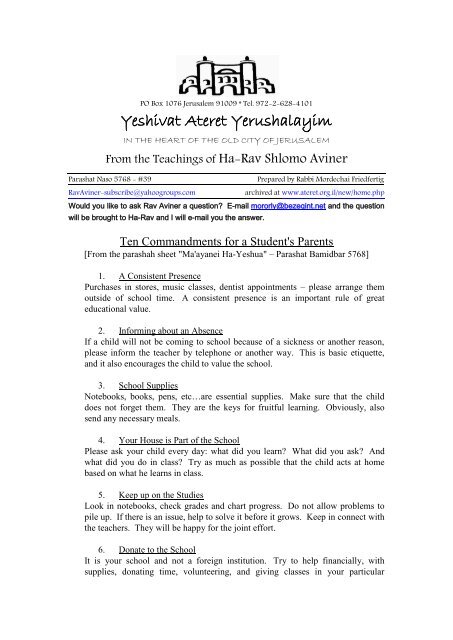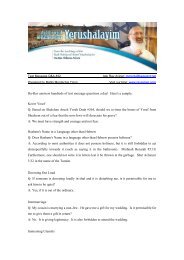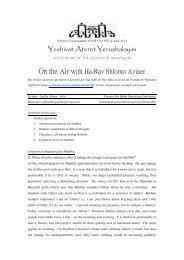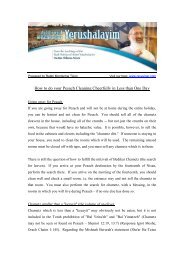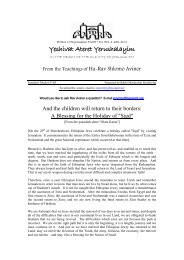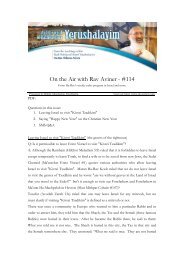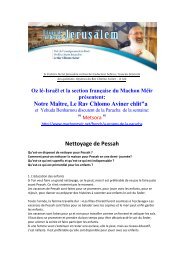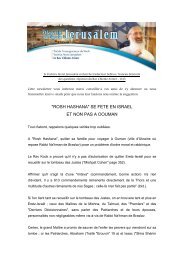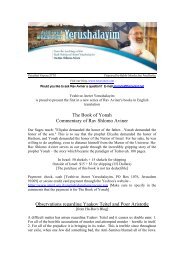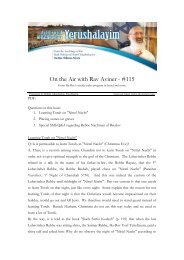Yeshivat Ateret Yerushalayim
Yeshivat Ateret Yerushalayim
Yeshivat Ateret Yerushalayim
Create successful ePaper yourself
Turn your PDF publications into a flip-book with our unique Google optimized e-Paper software.
PO Box 1076 Jerusalem 91009 * Tel. 972-2-628-4101<br />
<strong>Yeshivat</strong> <strong>Ateret</strong> <strong>Yerushalayim</strong><br />
IN THE HEART OF THE OLD CITY OF JERUSALEM<br />
From the Teachings of Ha-Rav Shlomo Aviner<br />
Parashat Naso 5768 - #39<br />
RavAviner-subscribe@yahoogroups.com<br />
Prepared by Rabbi Mordechai Friedfertig<br />
archived at www.ateret.org.il/new/home.php<br />
Would you like to ask Rav Aviner a question E-mail mororly@bezeqint.net and the question<br />
will be brought to Ha-Rav and I will e-mail you the answer.<br />
Ten Commandments for a Student's Parents<br />
[From the parashah sheet "Ma'ayanei Ha-Yeshua" – Parashat Bamidbar 5768]<br />
1. A Consistent Presence<br />
Purchases in stores, music classes, dentist appointments – please arrange them<br />
outside of school time. A consistent presence is an important rule of great<br />
educational value.<br />
2. Informing about an Absence<br />
If a child will not be coming to school because of a sickness or another reason,<br />
please inform the teacher by telephone or another way. This is basic etiquette,<br />
and it also encourages the child to value the school.<br />
3. School Supplies<br />
Notebooks, books, pens, etc…are essential supplies. Make sure that the child<br />
does not forget them. They are the keys for fruitful learning. Obviously, also<br />
send any necessary meals.<br />
4. Your House is Part of the School<br />
Please ask your child every day: what did you learn What did you ask And<br />
what did you do in class Try as much as possible that the child acts at home<br />
based on what he learns in class.<br />
5. Keep up on the Studies<br />
Look in notebooks, check grades and chart progress. Do not allow problems to<br />
pile up. If there is an issue, help to solve it before it grows. Keep in connect with<br />
the teachers. They will be happy for the joint effort.<br />
6. Donate to the School<br />
It is your school and not a foreign institution. Try to help financially, with<br />
supplies, donating time, volunteering, and giving classes in your particular
field. Give compliments to the teachers and administrators who work extremely<br />
hard for your children.<br />
7. Listen Carefully to Emotionally Difficulties<br />
Pay attention if you child comes home in a good mood or upset. Ask him to<br />
include you in his experiences. Help him deal with difficult incidents – including<br />
the good ones!<br />
8. The School is Not Responsible for Your Home<br />
Do not ask the school to solve behavioral problems that your child displays at<br />
home, since a teacher's arm does not extend that far. The teacher also cannot ask<br />
you to be responsible for the student's behavior in class since you are not<br />
there. Neither can place responsibility on the other, but you must work<br />
cooperatively.<br />
9. Do Not Criticize the Teacher<br />
Even if you have criticisms about the teacher – do not criticize him/her in front of<br />
your child. You will undermine the teacher's authority and destroy the student's<br />
potential to be positively influenced. You also do not always understand how<br />
complex the role of the teacher is. There is a joke about the parent who blames<br />
the teacher for his child's difficulties because the teacher does not listen to the<br />
parent's advice: "Ben sorer" (a wayward son) – "U-moreh" ("and rebellious" –<br />
"moreh" is also the same word as "a teacher") who does not listen to the voice of<br />
his father and mother (play on Devarim 21:18).<br />
10. You are also Responsible<br />
The teachers are your agents, but do not place all of the work on them. You are<br />
also responsible.<br />
Dearest parents! Dearest teachers! If you have other commandments, please<br />
send them to me!<br />
Text Message Responsa<br />
Ha-Rav answers hundreds of text message questions a week. Some appear in the parashah<br />
sheets "Ma'ayanei Ha-Yeshu'ah" and "Olam Ha-Katan." Here's a sample:<br />
Q: It is permissible to sign-in as present at a class and leave before the class is over<br />
A: Only if it is agreed upon from the outset that it is permissible.<br />
Q: Someone said that soldiers died on account of immodestly dressed women. Is this true<br />
A: We do not know the secrets of Hashem.<br />
Q: I had a good dream. What can I do to bring it to bring it to fruition<br />
A: Increase prayer, repentance and tzedakah.<br />
Q: Is it permissible to marry a young woman who will not cover her hair<br />
A: The essential thing is a good heart, then everything will work out.<br />
Q: Is it permissible to remove a splinter from one of my parents when it will hurt
A: Only if you are sure that it will not cause them to bleed.<br />
Q: Is it permissible to place Tefillin over a watch<br />
A: Yes, it is permissible to have the strap go over the watch, but the box must be directly on the<br />
skin.<br />
Q: Is it permissible to eat foods which may cause one to violate "Safeguard your soul" (i.e. your<br />
body)<br />
A: Eating unhealthy food is a bad trait and one violates "Follow in His ways" – Rambam, Hilchot<br />
De'ot chapter 4.<br />
Q: Is it permissible to move a cell phone on Shabbat if I need the spot where it is sitting<br />
A: Yes, since it is a muktzeh item used for a forbidden labor which may be moved in such a<br />
case. It is not considered a muktzeh item which one does not often handle for fear of breaking it<br />
and losing money since people freely move cell phones around in the course of a day.<br />
Q: Is it forbidden to kiss one's tzitzit during the Shema recited at nighttime<br />
A: There is no prohibition, but it is not customary and we should not create new customs.<br />
Q: I have been told that meat which says "Kosher" is permissible only after the fact. Is this true<br />
A: Any product which has kosher supervision from a known Rabbi is kosher; and one who wants<br />
may be strict, but he should not scorn one who is not strict.<br />
Q: I work in a book store. Is it permissible for me to sell and recommend inappropriate books<br />
A: It is forbidden because it will cause others to stumble and one should make a living in a clean<br />
fashion.<br />
Q: Is it permissible for me to ask for and pray for a particular young man whom I like<br />
A: Yes, but it must be a plea and not a demand, since Hashem has different calculations than we<br />
do and it will all be for the best.<br />
Prayer – Part 1<br />
Stories of Rabbenu – Our Rabbi<br />
Ha-Rav Tzvi Yehudah Ha-Cohain Kook<br />
When our Rabbi was asked what should one do to strengthen one's spirit, especially in the<br />
area of prayer, he said that one must first learn the foundations of the laws of prayer<br />
according to the "Mishnah Berurah," and obviously put into practice what was learned. One<br />
must understand that prayer is a form of connection between a person and Hashem, as Maran<br />
(our revered teacher) Ha-Rav Kook explains. When people do not understand and do not pay<br />
attention to the content of the prayers then they "say prayers," but they do not pray. One must<br />
learn the laws of prayer which includes proper intention during prayer, proper conduct while<br />
praying, the places where it is permissible and forbidden to pray, what direction to face and<br />
with what type of fear of Hashem we approach prayer. It is proper to learn the introduction to<br />
the siddur "Olat Re’iyah" (thoughts of Maran Ha-Rav Kook on the siddur) which explains the<br />
importance of prayer, and that one should pray with joy and under duress.<br />
Our Rabbi emphasized that prayer is one of the things that starts at the pinnacle of the world<br />
(Berachot 6b), and he therefore taught an ongoing class in "Olat Re’eiyah."
Our Rabbi prayed with incredible seriousness and concentration and put his entire self into his<br />
prayer. He never looked in a book (which was not a siddur) during the time of prayer, since<br />
learning Torah has its own time and prayer has its own time (Shabbat 10a).<br />
He either prayed by heart or from a siddur which he removed from the inner pocket in the<br />
upper part of his jacket, since he was extremely careful not to put holy books in his lower<br />
pockets.<br />
Our Rabbi would often emphasize the awe of holiness which is required during the time of<br />
prayer. He would say: How is it possible to pray quickly before the King<br />
All of his prayers were similar in their awe: he would always be joyous at the same spots and<br />
sad at the same spots.<br />
Our Rabbi prayed as if this was the first and only time in his life that he ever prayed: By<br />
emphasizing every word, by enunciating every letter, each syllable served as a source for<br />
thoughts as if he was not saying this prayer, in this same version, for twenty years, three times<br />
a day, every day. The words left his mouth as if they were new, a prayer which was not<br />
"commandments of people performing them by rote" (Yeshayahu 29:13) (newspaper<br />
interview, Zeraim 5720, in Ma’aracha Ha-Tziburit vol. 2 p. 78).<br />
Our Rabbi would exert great effort in prayer, until sometimes sweat would run down from<br />
under his hat. He would say about this: "Fortunate is a man who will not forget You and a<br />
person who will exert great effort for You."<br />
Our Rabbi requested from a student to be the shaliach tzibur (leader of the prayers). The<br />
student said that he did not have a good voice. Our Rabbi responded: "The essential thing is<br />
the intention."<br />
It was extremely upsetting to our Rabbi when a shaliach tzibur would pray quickly in a dry<br />
manner. He therefore preferred a fixed shaliach tzibur who would pray with fire, not too fast<br />
and not too slow, but the essence was with fervor and reverence.<br />
Shut She'eilat Shlomo - Questions of Jewish Law<br />
Sitting and Working in a Coffee Shop<br />
Q: I like to buy a cup of coffee and work on my laptop in a coffee shop. How long can I sit<br />
and work there if I only buy one cup of coffee<br />
A: The essential criterion is not to bother other people. Thus, if other people are waiting for<br />
tables, you may not sit there indefinitely. There are no hard and fast rules. You should<br />
follow what is accepted practice. In your case, perhaps it is appropriate to sit there for an<br />
hour.<br />
Special thank you to Fred Casden for editing the <strong>Ateret</strong> <strong>Yerushalayim</strong> Parshah Sheet


